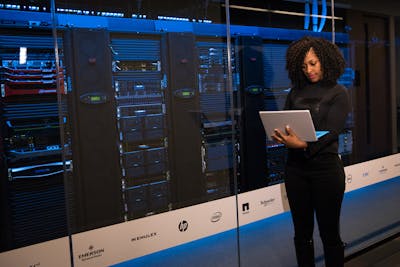Artificial Intelligence (AI) has evolved from a futuristic concept to an integral part of our daily lives. From the moment we wake up to our smartphone alarms to the personalized recommendations we receive on streaming platforms, AI is quietly revolutionizing how we interact with technology and each other.
AI in Communication and Social Media
One of the most visible applications of AI today is in how we communicate. Social media platforms use sophisticated algorithms to curate our feeds, showing us content that's most likely to engage us. Email services automatically filter spam and categorize messages, while translation tools break down language barriers in real-time.
Smart keyboards on our phones learn our typing patterns and suggest words, making communication faster and more efficient. Voice assistants like Siri, Google Assistant, and Alexa have become household staples, helping us set reminders, control smart home devices, and answer questions with natural language processing.
Transforming the Workplace
The workplace is experiencing a significant transformation thanks to AI integration. Automated scheduling tools optimize meeting times across different time zones, while project management platforms use AI to predict potential bottlenecks and suggest resource allocation.
Customer service has been revolutionized with AI chatbots that can handle routine inquiries 24/7, freeing human agents to focus on complex issues. Document analysis tools can process contracts and legal documents in minutes rather than hours, while AI-powered analytics help businesses make data-driven decisions faster than ever before.
Key Workplace AI Applications:
- Automated Email Responses: AI can draft and send routine email responses
- Calendar Optimization: Smart scheduling that considers preferences and priorities
- Data Analysis: Instant insights from complex datasets
- Content Creation: AI-assisted writing and design tools
- Recruitment: Resume screening and candidate matching
Healthcare and Personal Wellness
AI is making healthcare more accessible and personalized. Fitness trackers use machine learning to understand our activity patterns and provide personalized health recommendations. Mental health apps analyze speech patterns and text inputs to provide support and early intervention suggestions.
Telemedicine platforms use AI to help doctors make more accurate diagnoses by analyzing symptoms and medical history. Drug discovery, traditionally a decades-long process, is being accelerated through AI algorithms that can identify promising compounds in a fraction of the time.
Smart Home Integration
Our homes are becoming increasingly intelligent. Smart thermostats learn our preferences and adjust temperature automatically, while security systems use facial recognition to identify family members and alert us to unfamiliar visitors.
AI-powered home assistants can control lighting, music, and appliances through voice commands, creating a seamless living experience. Energy management systems optimize power consumption based on usage patterns, helping reduce both costs and environmental impact.
Transportation and Mobility
The transportation sector is undergoing a massive AI-driven transformation. Navigation apps use real-time traffic data and machine learning to suggest the fastest routes, while ride-sharing platforms optimize driver-passenger matching and pricing.
Autonomous vehicles, while still in development, promise to revolutionize how we think about transportation. Even today's cars feature AI-powered safety systems like automatic emergency braking, lane departure warnings, and adaptive cruise control.
Entertainment and Content Creation
Streaming services use AI to analyze viewing habits and recommend content tailored to individual preferences. Music platforms create personalized playlists that introduce us to new artists while considering our mood and activity.
Content creators are leveraging AI tools for video editing, thumbnail generation, and even script writing. Gaming experiences are becoming more immersive with AI-driven non-player characters that adapt to player behavior and create unique storylines.
Challenges and Considerations
While AI offers tremendous benefits, it also presents challenges that we must address thoughtfully:
- Privacy Concerns: AI systems often require access to personal data
- Job Displacement: Automation may eliminate certain job categories
- Bias and Fairness: AI systems can perpetuate existing biases
- Dependence: Over-reliance on AI may reduce human skills
- Security: AI systems can be vulnerable to attacks and manipulation
Looking Ahead: The Next Frontier
The future of AI in everyday applications looks incredibly promising. We can expect to see more sophisticated personal assistants that understand context and emotion, AI tutors that adapt to individual learning styles, and smart cities that optimize everything from traffic flow to energy distribution.
Augmented reality (AR) and virtual reality (VR) experiences will become more realistic and accessible through AI processing. Creative industries will see AI tools that can generate art, music, and literature while collaborating with human creators rather than replacing them.
Preparing for an AI-Integrated Future
To thrive in an AI-integrated world, it's essential to:
- Stay informed about AI developments and their implications
- Develop skills that complement AI capabilities
- Understand privacy settings and data sharing policies
- Maintain critical thinking skills to evaluate AI-generated content
- Embrace lifelong learning to adapt to changing technologies
Conclusion
AI is no longer a distant future concept—it's here, integrated into our daily routines in ways both obvious and subtle. From improving our productivity at work to enhancing our entertainment experiences at home, AI is making our lives more convenient, efficient, and connected.
The key to successfully navigating this AI-integrated future lies in understanding these technologies, embracing their benefits while being mindful of their limitations, and maintaining the human elements that make our experiences meaningful. As AI continues to evolve, those who adapt and learn alongside these technologies will be best positioned to thrive in our increasingly connected world.
The future of AI in everyday applications is not just about the technology itself, but about how we choose to integrate it into our lives in ways that enhance rather than replace human connection, creativity, and purpose.



